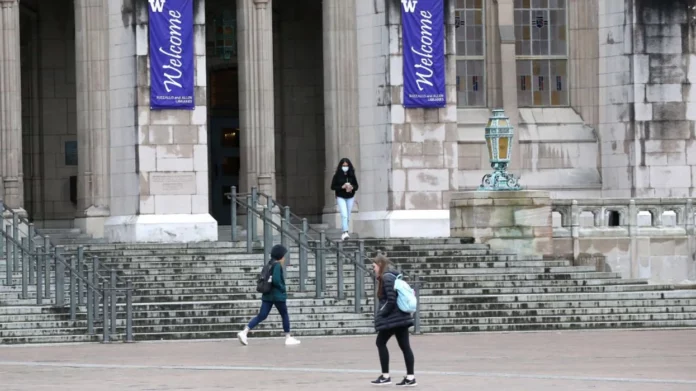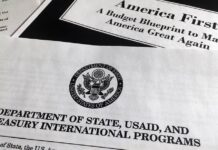The University of Washington acknowledged late last year that its psychology department zealously discriminated against white and Asian candidates. A spokeswoman for the school provided a critical detail to Newsweek Thursday concerning how precisely the school’s systemic racist practices were first brought to light.
Dianne Harris, dean of the College of Arts and Sciences, asked the University Complaint Investigation and Resolution office on May 17 to review “possible issues concerning the hiring processes employed in the Department of Psychology.”
According to a redacted report issued by the UW Civil Rights Investigation Office, Harris specifically asked whether the race of the candidates had factored into the department’s hiring decision pertaining to a tenure track assistant professorship.
A UW spokeswoman told Newsweek that Harris was responding at the time to concerns raised by “an internal whistleblower.”
The CRIO report revealed — on the basis of emails, recorded faculty meetings, and an interview — that the department’s Diversity Advisory Committee, involved in the hiring process, cajoled the hiring committee into changing their unanimously-decided ranking of candidates for the so-called “Diversity in Development” faculty position. Furthermore, the hiring committee was pressured to alter “the process to provide disparate opportunities for candidates based on their race.”
The hiring committee initially narrowed down a field of 84 applicants to five candidates. After further winnowing, the committee identified three viable prospects, which were then ranked on the basis of an unanimous decision in light of their merits. The top candidate happened to be white. The runner-up was Asian. The third pick was black.
Up until this point in the hiring process, the committee had ostensibly adhered to the university’s Executive Order 31, prohibiting discrimination on the basis of race, color, and other immutable characteristics in recruitment, hiring, training and promotions. It was apparently also in compliance with state law, which banned race-based hiring in 1998, and Title VII of the Civil Rights Act of 1964. However, such fleeting adherence did not produce the result the Diversity Advisory Committee wanted.
In addition to prompting the hiring committee to defend why the “White candidate ended up ranked higher” than the black candidate, members of the DAC suggested it was bad optics not to advance a candidate of a preferred race.
“I was unsettled about the offer-order outcome for the following reasons: First, with three above threshold candidates (Black, Asian, White), it just seemed optically-speaking to look bad that offer #1 goes to the White candidate whom is the most junior and whose research content is less directly and explicitly connected to matters of race/ethnicity,” wrote one DAC member.
The same committee member suggested that the acknowledgement the white candidate was the most qualified of the three evidenced “some degree of undetected/unacknowledged bias.”
After concern-mongering about bias, the committee member unironically suggested the “faculty constitution” could do with less whiteness. According to the department’s “Promising Practices for Increasing Equity in Faculty Searches” handbook — the de facto guide for hiring until the internal whistleblower spoke out — this would be par for the course. After all, the handbook boasted that in the 2020-21 academic year, the department hired non-white candidates for five tenure-track roles.
The DAC chose not to endorse the hiring committee’s ranking and ultimately got its way, prompting the hiring committee members to cave and to agree to a revised order where the least-viable candidate was pushed to the front ahead of both the white and Asian applicants. Despite being understood to rank highest on the merits, the white candidate was moved to third.
The National Association of Scholars highlighted that the holdout committee members did not change their minds “about which candidate is most qualified.” Rather, the report makes clear they acquiesced regarding the changing of the candidate order for a number of reasons unrelated to the merit of the candidates:
- “So as not to create a ‘Bloodbath’ at a faculty meeting”;
- “So the Developmental Area is not accused of ‘not prioritizing DEI'”
- “Because they were worried junior faculty will hear a lot of ‘nasty stuff’ said at the faculty meeting and wonder if they were hired simply because of their races”
- “Because they thought it would result in a failed search”; and
- “Because it was creating personal stress on them, to the point that [name redacted] stated ‘I wish I could quit this job’ and [named redacted] wrote, ‘I cannot condone this search process and do not want to be asked to speak about it in person.'”
Department members involved with the talent search acknowledged that discrimination was afoot, but rather than calling it out, they tried to keep it under wraps.
“I advise deleting the statement below,” wrote one department member, “as it shows that [black] applications were singled out and evaluated differently than non URM applications.”
The UW admitted in an Oct. 31 announcement that “[r]ace was inappropriately considered in the hiring process even after some faculty received guidance from College of Arts & Sciences and University leadership that such considerations are inappropriate.”
Despite this admission and apologies to the “affected candidates,” it appears the psychology department nevertheless hired the candidate who had been prioritized on account of their complexion.
“The successful candidate is unquestionably qualified, and we are proud to have them as a valued faculty member in the department and at the University,” UW said in a statement. “They had no knowledge of the concerns raised and have our full support and respect, which we have communicated directly.”
For its racist practices, the psychology department has been barred from conducting searches for tenured and tenure-track faculty position for two years. All members of the department must also undergo training on how not to violate the law and university policy when conducting searches.
John Sailer, a senior fellow at the National Association of Scholars who pressed the UW in April 2023 for records pertaining to several faculty job searches, including the Diversity in Development search, was set to receive additional staff emails from the UW’s public record office last month. However, the university recently indicated it will not release the documents until April 26.
“These requests are processed on a first-in, first-out basis and some are more complicated than others; his request was quite comprehensive, requiring significant review and redaction considerations, and as a result, it is still in progress,” the university told Newsweek.
While there may be yet more damning revelations to come, Sailer told Newsweek that the UW report already “shows universities — professors and administrators alike — discriminate with a total sense of impunity.”
“It’s an egregious example, notable for how much is in writing, but it really is just one more example,” continued Sailer. “This kind of discrimination in the name of ‘equity’ is commonplace, even when blatantly illegal. And that’s instructive in light of Students For Fair Admissions.”
“Until its investigation, administrators from the university promoted the psychology department’s hiring framework, which the university has now deemed to be in violation of its non-discrimination policy,” added Sailer. “That’s a big reversal.”




